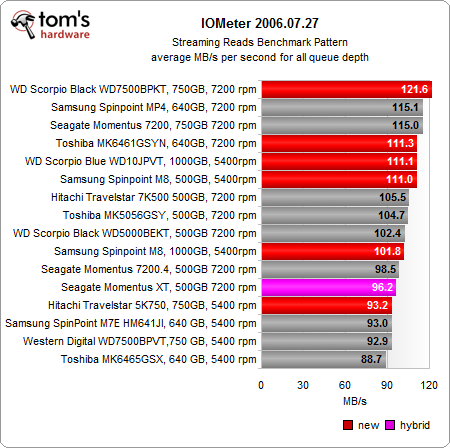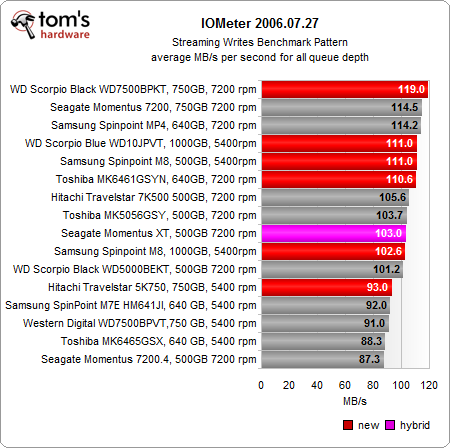Six 2.5” High-Capacity Notebook Hard Drives
Advanced Format technology makes it possible to build 9.5 mm high 2.5” hard disks with 500 GB per platter. The result is a range of slim and speedy storage giants.
Benchmark Results: Streaming Reads/Writes
It seems obvious: performance-oriented hard drives with 7200 RPM spindles and correspondingly low access times should top the charts in Iometer’s streaming benchmark.
The reality is a little bit different, though. While Western Digital’s WD7500BPKT sits unchallenged at the top of the chart, the other 7200 RPM disk, Toshiba’s MK6461GSYN, and two 5400 RPM models (Samsung’s Spinpoint M8 HN-M500MBB and Western’s Digital Scorpio Blue WD10JPVT), are clustered together below. Samsung’s Spinpoint M8 HN-M101MBB and the slowest drive, Hitachi’s Travelstar 5K750 HTS547575A9E384, trail far behind.
Get Tom's Hardware's best news and in-depth reviews, straight to your inbox.
Current page: Benchmark Results: Streaming Reads/Writes
Prev Page Benchmark Results: Data Rate And Interface Bandwidth Next Page Benchmark Results: Access Time And I/O Performance-
arpitnathany On the western digital hard disk page the Western Digital Scorpio Black WD7500BPKT is mentioned as 750 TB please correct it.Reply
Nice article as a whole
-
acyuta Good to have all the latest data in one place. Wish Dell had put in the 750GB Scorpio Black instead of 750GB Momentus in my XPS15.Reply
One minor point: good to know that i7-920 is now part of Sandybridge. Can you check???
-
JeTJL Wonder how well these things survive the drop test. If they can survive a fall that a SSD can sustain then I'll be up for it. Other than that wish higher capacity SSDs become cheaper.Reply -
AppleBlowsDonkeyBalls Western Digital hard drives sound good in theory for laptops, but they're not. I would never use one unless they fix a fatal flaw.Reply
What flaw? The fact that the hard drive automatically goes to sleep (parks its head) after eight seconds of inactivity, and since this is hardwired into the firmware it completely dismisses what you set in your Power Options in the Windows 7 Control Panel. Why is this bad? Because if the HDD is inactive for more than eight seconds it needs to unpark its head, and that creates a very noticeable lag when launching applications or working with files because the process takes a few seconds to complete, not to mention it puts more stress on the HDD mechanics.
Unless it's simply for a storage drive where you don't care about performance I recommend you go with Seagate, Hitachi, or Samsung for laptop HDDs instead. -
cadder Current prices are a bit higher than what is mentioned in the article, actually pretty scary:Reply
Hitachi 750GB $140-160
Samsung 1TB $220
WD 750GB $160
WD 1TB $230

